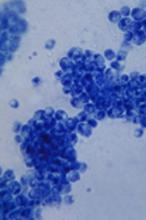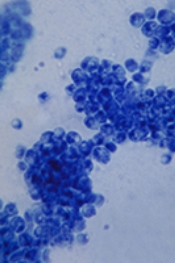User login
The U.S. Food and Drug Administration (FDA) has granted Qualified Infectious Disease Product (QIDP) and fast track designations for rezafungin, an injection for the prevention of invasive fungal infections in adults undergoing allogeneic bone marrow transplantation.
Rezafungin is a novel antifungal echinocandin being developed by Cidara Therapeutics to treat candidemia and invasive candidiasis and for prophylaxis of invasive fungal infections due to Candida, Aspergillus, and Pneumocystis.
These pathogens typically affect patients with compromised immune systems, such as patients undergoing organ, bone marrow transplants, or chemotherapy.
Rezafungin is administered as a once-weekly, high-exposure therapy. According to Cidara, no one agent is approved to prevent infections caused by these pathogens. Current prophylaxis regimens often require multiple antifungal drugs, causing safety and tolerability issues.
The QIDP designation offers incentives for the development of new antifungal and antibacterial drugs, including fast track, priority review and, if approved by the FDA, eligibility for an additional five years of marketing exclusivity.
Fast track designation enables more frequent interactions with the FDA review team to expedite drug development.
For QIDP designation, a drug candidate must treat serious or life-threatening infections, particularly those caused by bacteria and fungi resistant to treatment or by resistant pathogens identified by the FDA.
Rezafungin acetate, formerly known as CD101 IV, met its primary safety and efficacy objectives in the phase 2 STRIVE trial, providing support for the company to initiate phase 3 trials.
The phase 2 trial compared rezafungin to caspofungin in patients with candidemia and/or invasive candidiasis.
Investigators enrolled 92 patients in the microbial intent-to-treat population.
Patients were randomized to one of two dose groups of rezafungin or to the caspofungin arm.
One hundred percent of patients with invasive candidiasis responded to the rezafungin 400 mg first-week dose followed by 200 mg once weekly up to four weeks, compared to 33% of patients who responded to daily caspofungin.
The company reported no concerning adverse event trends.
Cidara is initiating phase 3 pivotal trials of rezafungin in the treatment of candidemia and invasive candidiasis and the prophylaxis of invasive fungal infections.
The U.S. Food and Drug Administration (FDA) has granted Qualified Infectious Disease Product (QIDP) and fast track designations for rezafungin, an injection for the prevention of invasive fungal infections in adults undergoing allogeneic bone marrow transplantation.
Rezafungin is a novel antifungal echinocandin being developed by Cidara Therapeutics to treat candidemia and invasive candidiasis and for prophylaxis of invasive fungal infections due to Candida, Aspergillus, and Pneumocystis.
These pathogens typically affect patients with compromised immune systems, such as patients undergoing organ, bone marrow transplants, or chemotherapy.
Rezafungin is administered as a once-weekly, high-exposure therapy. According to Cidara, no one agent is approved to prevent infections caused by these pathogens. Current prophylaxis regimens often require multiple antifungal drugs, causing safety and tolerability issues.
The QIDP designation offers incentives for the development of new antifungal and antibacterial drugs, including fast track, priority review and, if approved by the FDA, eligibility for an additional five years of marketing exclusivity.
Fast track designation enables more frequent interactions with the FDA review team to expedite drug development.
For QIDP designation, a drug candidate must treat serious or life-threatening infections, particularly those caused by bacteria and fungi resistant to treatment or by resistant pathogens identified by the FDA.
Rezafungin acetate, formerly known as CD101 IV, met its primary safety and efficacy objectives in the phase 2 STRIVE trial, providing support for the company to initiate phase 3 trials.
The phase 2 trial compared rezafungin to caspofungin in patients with candidemia and/or invasive candidiasis.
Investigators enrolled 92 patients in the microbial intent-to-treat population.
Patients were randomized to one of two dose groups of rezafungin or to the caspofungin arm.
One hundred percent of patients with invasive candidiasis responded to the rezafungin 400 mg first-week dose followed by 200 mg once weekly up to four weeks, compared to 33% of patients who responded to daily caspofungin.
The company reported no concerning adverse event trends.
Cidara is initiating phase 3 pivotal trials of rezafungin in the treatment of candidemia and invasive candidiasis and the prophylaxis of invasive fungal infections.
The U.S. Food and Drug Administration (FDA) has granted Qualified Infectious Disease Product (QIDP) and fast track designations for rezafungin, an injection for the prevention of invasive fungal infections in adults undergoing allogeneic bone marrow transplantation.
Rezafungin is a novel antifungal echinocandin being developed by Cidara Therapeutics to treat candidemia and invasive candidiasis and for prophylaxis of invasive fungal infections due to Candida, Aspergillus, and Pneumocystis.
These pathogens typically affect patients with compromised immune systems, such as patients undergoing organ, bone marrow transplants, or chemotherapy.
Rezafungin is administered as a once-weekly, high-exposure therapy. According to Cidara, no one agent is approved to prevent infections caused by these pathogens. Current prophylaxis regimens often require multiple antifungal drugs, causing safety and tolerability issues.
The QIDP designation offers incentives for the development of new antifungal and antibacterial drugs, including fast track, priority review and, if approved by the FDA, eligibility for an additional five years of marketing exclusivity.
Fast track designation enables more frequent interactions with the FDA review team to expedite drug development.
For QIDP designation, a drug candidate must treat serious or life-threatening infections, particularly those caused by bacteria and fungi resistant to treatment or by resistant pathogens identified by the FDA.
Rezafungin acetate, formerly known as CD101 IV, met its primary safety and efficacy objectives in the phase 2 STRIVE trial, providing support for the company to initiate phase 3 trials.
The phase 2 trial compared rezafungin to caspofungin in patients with candidemia and/or invasive candidiasis.
Investigators enrolled 92 patients in the microbial intent-to-treat population.
Patients were randomized to one of two dose groups of rezafungin or to the caspofungin arm.
One hundred percent of patients with invasive candidiasis responded to the rezafungin 400 mg first-week dose followed by 200 mg once weekly up to four weeks, compared to 33% of patients who responded to daily caspofungin.
The company reported no concerning adverse event trends.
Cidara is initiating phase 3 pivotal trials of rezafungin in the treatment of candidemia and invasive candidiasis and the prophylaxis of invasive fungal infections.

